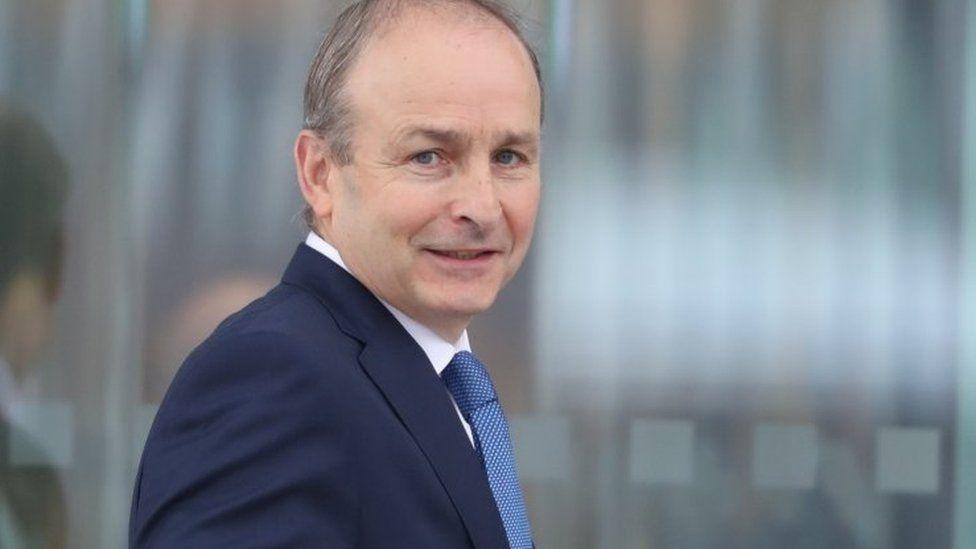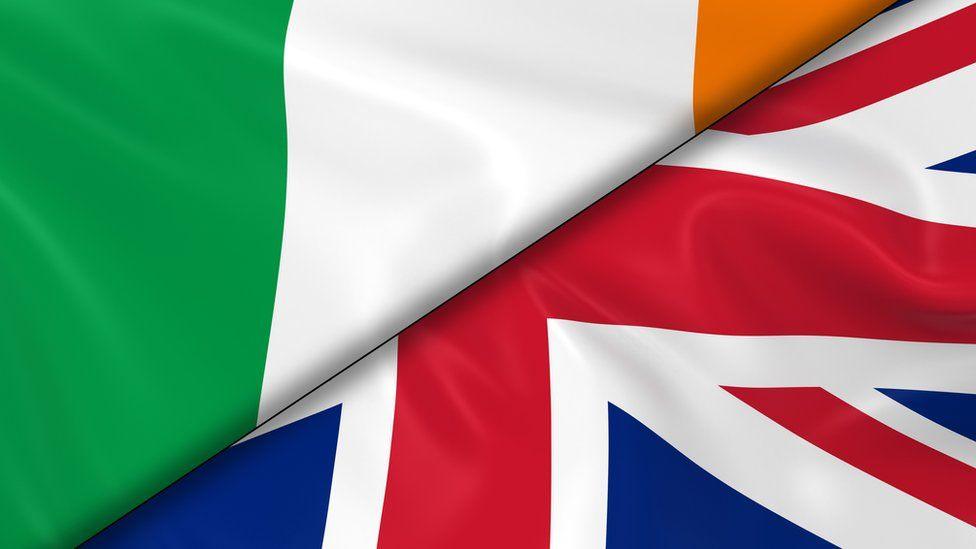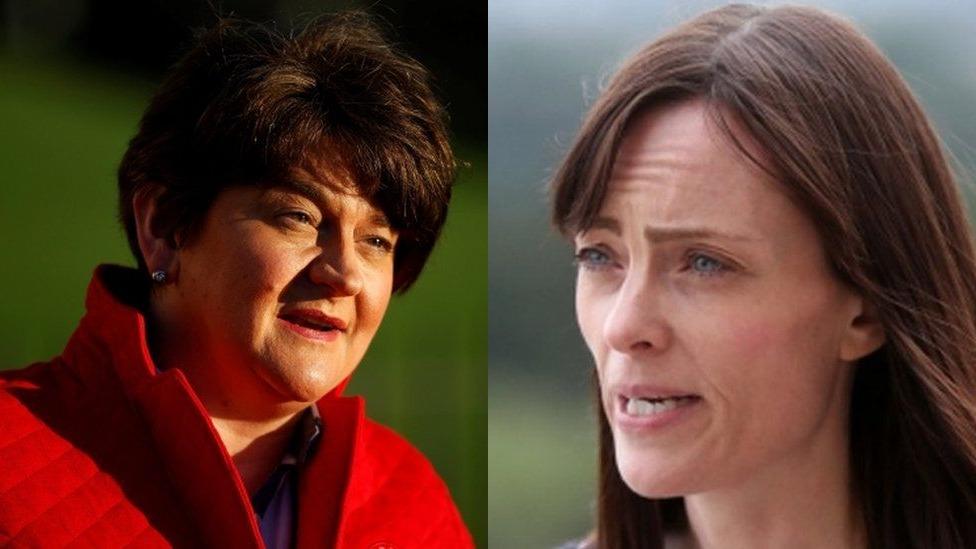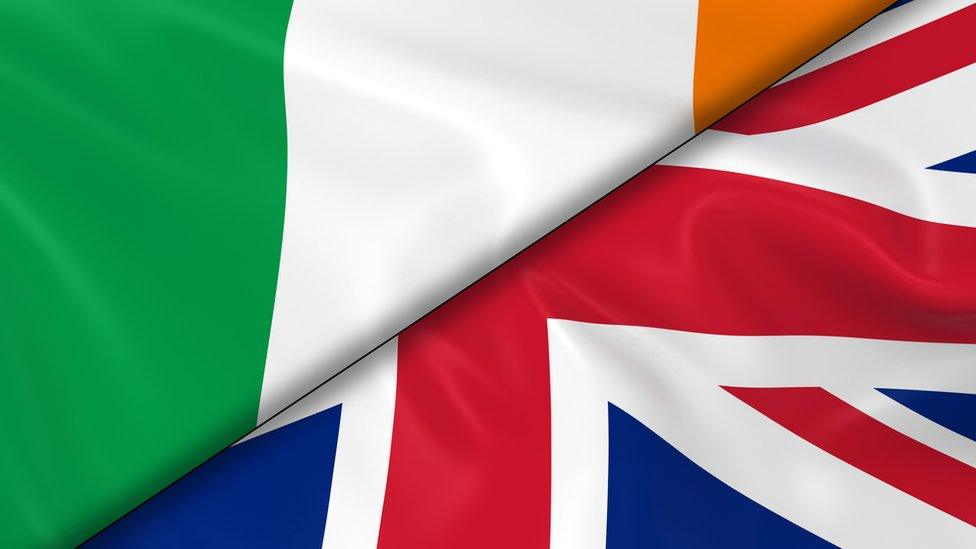Failure to attend north-south meetings 'unacceptable' - Irish PM
- Published

Taoiseach Michéal Martin says failure to attend north-south meetings was regrettable
It is "not acceptable" that there has been a pulling back from meetings involving ministers from Belfast and Dublin, the taoiseach (Irish PM) has said.
It comes as the Irish and UK governments have agreed to hold a high level conference in June.
Democratic Unionist Party (DUP) politicians have failed to attend recent virtual cross-border meetings.
First Minister Arlene Foster attended a rescheduled meeting on Wednesday.
It involved Infrastructure Minister Nichola Mallon and her Irish counterpart.
Last month, the DUP was criticised for not taking part in a meeting of the North-South Ministerial Council (NSMC) between Infrastructure Minister Nichola Mallon and Irish Transport Minister Eamon Ryan.
At the time, Ms Mallon claimed the meeting had been "blocked from proceeding because no accompanying unionist minister would make themselves available".
But Mrs Foster said the agenda had not been agreed with her office and that a minister was not available.

The NSMC is the main body for cross-border co-operation between the governments of Northern Ireland and the Republic of Ireland
She also said that there had been much "misplaced" and "mischievous" commentary that the party was refusing to attend meetings between the Northern Ireland Executive and the Irish government.
The NSMC is the main body for cross-border co-operation between the governments of Northern Ireland and the Republic of Ireland.
Later in the month, a meeting involving Economy Minister Diane Dodds went ahead, but a later meeting involving Agriculture Minister Edwin Poots was cancelled as the latter did not go.
It is understood some MLAs who signed a vote of no confidence in Arlene Foster's leadership last week raised concerns about the party's involvement in north-south discussions.
Under the party's five-point plan in protest at post-Brexit arrangements for Northern Ireland, DUP ministers are refusing to take part in north-south engagement where the protocol is being discussed.
On Wednesday, David Campbell, chairman of the Loyalist Communities Council (LCC) said that unionist politicians "are correct in withdrawing from north-south meetings until respect for the agreement is restored".
He added that Taoiseach (Irish prime minister) Michéal Martin and his government "need to start listening".
Allow X content?
This article contains content provided by X. We ask for your permission before anything is loaded, as they may be using cookies and other technologies. You may want to read X’s cookie policy, external and privacy policy, external before accepting. To view this content choose ‘accept and continue’.
Northern Ireland Secretary Brandon Lewis and Irish Foreign Minister Simon Coveney agreed on Wednesday to hold a meeting of the British-Irish Intergovernmental Conference in June - the first since mid 2019.
"We are aware that there are sincerely held concerns in different communities in Northern Ireland in relation to a number of issues and firmly agree that the best way forward is through dialogue and engagement," a joint statement said.
"We recognise the responsibility we all bear to enhance the confidence of everyone in Northern Ireland in all the institutions of the [Good Friday] Agreement to help realise its vision for reconciliation, equality, respect for rights and parity of esteem."
Meanwhile, Mr Martin also described an Irish language act for Northern Ireland as "important" because it embodies the principle of parity of esteem.
Opportunities
He said such an act should not be political as "it sheds light on a culture" and provides opportunities.
The taoiseach told the Dáil (Irish parliament) that he and his UK counterpart Boris Johnson had agreed to meet in person as soon as circumstances allow.
He and the Sinn Féin leader Mary Lou McDonald both told the house that they met the Secretary of State for Northern Ireland Brandon Lewis on Wednesday morning ahead of Mr Lewis' private meeting with Irish Foreign Minister Simon Coveney.
She said she told Mr Lewis there needed to be delivery on an Irish language act and the Stormont House legacy arrangements as part of the New Decade New Approach that saw the return of devolution.
- Published16 April 2021

- Published19 September 2019
